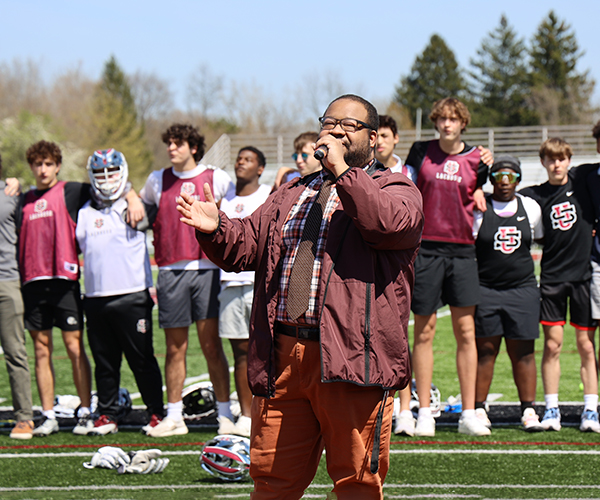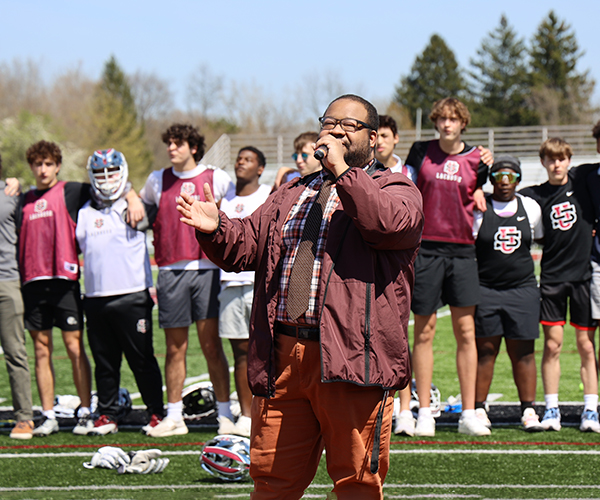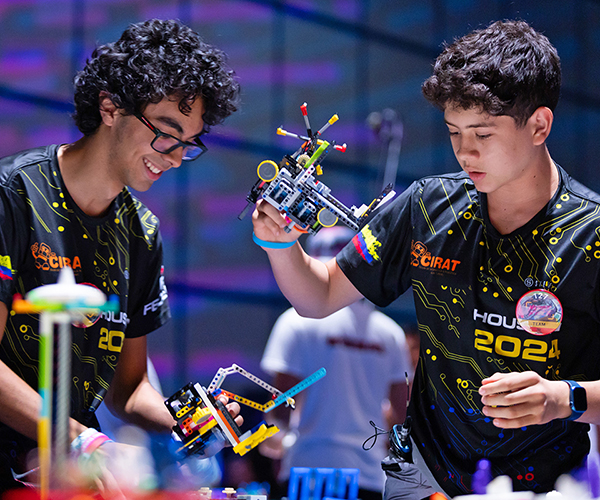Prep School
Getting your child ready for the first day of preschool may seem daunting. Rather than focusing on numbers and letters, prepare by practicing to share, sit still and clean up.
Isaac Dunford links large Duplo blocks and delicately places a plastic elephant inside a white fence.
"I'm building a zoo!" he announces, tapping his mom Abby's arm to get her attention.
Kitty-corner across the table at the Shaker Heights Starbucks, his friend Niko Tadic stacks oversized Legos and puts red plastic apples on top. He says something that's difficult to understand.
"So your T. rex can reach them?" asks his mother Kerry, translating. Across from Niko, his sister Maja licks cream from a maple sandwich cookie and giggles.
The moms get the children together regularly for play dates. Isaac and Maja will turn 5 in September, but both families have decided to keep them in preschool for another year. Niko is 3 and will start preschool this fall.
To get him ready, Kerry started potty training this summer. Last year, he attended a Moving Up class for two hours, once a week, with her in the room. While some moms eventually made it out of the room, Niko wanted her to stay with him.
So while she's working with him on separating, she also takes him to Abby, a speech pathologist, for speech therapy.
"It's a way to build confidence," Kerry says. "I think when he's more confident with his speaking ability, then he's more apt to want to separate, because he can communicate his needs. Now, everyone looks to me to translate."
Using the bathroom independently, separating easily and communicating clearly are critical skills for confidently sending a child off to preschool this fall, experts say.
Other important skills are part of the "unwritten curriculum" of preschool, says Jane Thornton, director of the preprimary division at Laurel School in Shaker Heights.
Children master learning how to come to school and how to work with a teacher at different rates, Thornton says. "A teacher is different than mom or dad or grandma," she says. "You can't sit in the teacher's lap every minute of the day when you want to because there are 14 other children who might want to do that."
But with the long continuum of child development, it can sometimes be a tough call for a parent as to whether your child should start preschool at the average age of 3, wait until he or she is older, or even get started a little earlier.
Here are some things you can do to help prepare your child for preschool:
Potty training. The average age for potty training is 3, says Dr. Richard So, a pediatrician at the Cleveland Clinic's Independence Family Health Center. "The earlier you start, the longer it takes and the more frustrating it is." Girls usually potty train before boys, he adds. Not all preschool programs require a child to be full potty trained, so rather than pressure a child, he recommends parents explore other options.
Separating. Is the child able to separate from his parents? If not, parents can take baby steps prior to preschool, says Carolyn Ievers-Landis, a clinical psychologist at University Hospitals' Rainbow Babies and Children's Hospital. "Have your child with someone else — even short periods of time — for them to get used to you leaving and coming back, and getting used to having another adult caregiver," says Ievers-Landis.
Language. "When children are ready for preschool, they're able to express their needs through words and express their feelings," says Mary Beth Hilborn, director of the early childhood center at Hawken School. "Two-year-olds will use their bodies to express their feelings. They might hit instead of saying, 'I'm upset with you.' " Be sure to talk with your child and use words to explain what you're doing throughout the day, even when the task seems mundane, like grocery shopping or cooking.
Sitting still. Although many preschoolers are very energetic, schools will have "circle time" when a child is expected to sit and listen to a book or to talk about the weather that day. The best way to practice that skill is at dinner, says Ievers-Landis. Expect the child to sit for five or 10 minutes at a time, working up to the typical 20-minute dinner. Preschool story hours at the library are another good way to practice. Of course, a good preschool won't expect children to sit for long periods. Look for one that allows a lot of playtime.
Patience. Waiting in line. Waiting to speak. Waiting to use the purple crayon. Preschool involves a lot of waiting, and a child must have some patience to succeed. Reinforce this at home and on play dates by telling your child, "Yes, it's hard to wait." And thank them for being patient.
Engagement and curiosity. Does your child spend time on a task? Is she curious about things in nature or a new toy or person? Brown recommends taking nature walks or visiting museums and talking to your child about what he or she sees.
Taking turns and following directions. These skills are important for getting along in school, but can be a challenge to a typical preschooler. "Playing games, like Candy Land, are wonderful things to do to get ready for preschool," says Ievers-Landis. "It has that turn-taking aspect to it, and then doing things where the child has to share like having a play date."
Self care. Independence is an important, though still developing, skill in a preschool setting. "Can you hang up your coat and know where your things are?" says Hawken's Hilborn. "Being able to wash their hands is more important than if they know their ABCs or can count." Have your child practice tasks such as getting dressed, cleaning up and packing a backpack at home.
Routine. Having a routine keeps mornings running smoothly. Sleep is most important, says Ievers-Landis. Start putting your child to bed earlier while it's still summer, so the first few weeks of school aren't as exhausting.
And it's just as important to have a routine when you drop your child at preschool for an easier transition and separation. "Have a way to say goodbye and wish each other well in the morning," says Brown. "A closure to the morning and opening to the day. I knew a dad who would come in every day with his son, and he'd give him a high-five and he'd say, 'Make it a great day, son!' And this little boy would say, 'Make it a great day, Dad!' "
In the final days of summer, it's a good idea to walk by the school the child will be attending or go play on the playground, so the child gets to know the surroundings. But there's a delicate balance between helping the child become comfortable and creating too much anxiety over going to school, says Hilborn.
"Children don't have a concept of time," she says. "Build familiarity, but don't make it such a big, big deal."
Likewise, the experts say, don't worry about any specific required knowledge, such as counting to a certain number or knowing all the letters. Instead they emphasize that entering preschool is a time to concentrate on building a strong social and emotional foundation while playing and using the imagination.
After all, there will be time for all those other lessons when they're ready for the next milestone: kindergarten.
Step Ups
As your child moves from kidnergarted to elementary school to middle school and beyond, these strategies will make the transitiion easier.
Isaac Dunford is proud of the zoo he has made from his friends' Duplos.
"Mommy, I want to tell you about my zoo," he says, as his mom Abby talks with her friend Kerry Tadic.
But about 15 minutes later, Kerry and her children, Maja and Niko, need to leave the Starbucks where the children have been busy playing and eating maple cream cookies while the moms talk. She walks to Isaac's area and begins disassembling the zoo to take it with her.
The sudden destruction of the masterpiece he has worked so hard on is more than Isaac can take. He begins crying, stomping and yelling, "I want my zoo back!"
Abby calmly guides him through the difficult transition. "Say goodbye to the zoo," she says. "We're going to Miss Kerry's next week for a play date, and the Duplos will be there."
She directs his attention to a Dr. Seuss book on the table. Soon, Isaac is smiling again and sounding out words in Fox in Socks. "K-nox," he says.
"Remember, when there's a 'k' by an 'n,' does it make a noise?" his mom asks.
"Nox!" Isaac says proudly.
The dichotomy of having a child who, on the one hand, has difficulty with typical transitions and on the other is reading months before he turns 5, leaves a parent to wonder, "Should he start kindergarten or should we wait?"
"Redshirting" as it's called, borrowing the name from college athletics, is becoming more popular as parents wait to enter their children in kindergarten, hoping that being older when they start school makes them more successful in the long run. And it seems to work. A 2011 study by the National Bureau of Economic Research shows that math and reading scores in 10th grade were significantly higher in students who were older when they started kindergarten.
"When we recommend another year of prekindergarten, it really has nothing to do with cognitive ability," says Jane Thornton, director of the preprimary division at Laurel School. "It's really social-emotional."
In fact, there are several characteristics that Thornton suggests preschool teachers look for before recommending a child move on to kindergarten.
"Are children able to follow rules? Can they follow routine? Can they enter a social situation when they want to? What do they do when they're frustrated? Are they still bursting into tears and having temper tantrums?" she says. "Are they willing to take risks and try new things?"
The transition from home to preschool or preschool to kindergarten are big ones in a child's — and parent's — life. But there are ways parents can help children get through all the major transitions.
Kindergarten: Rhyming, it turns out, is a key indicator of a child's cognitive readiness for kindergarten. Laurel's Thornton recommends reading rhyming books such as Dr. Seuss or Shel Silverstein and singing rhyming songs with your child.
"When going to kindergarten, I'm big on Safety Town," says Dr. Richard So, a pediatrician at the Cleveland Clinic's Independence Family Health Center. "You need to know your first name, your last name, your phone number, your address and your parent's name."
Grade School: Entering first grade requires a child to be able to pay attention and sit longer, says Carolyn Ievers-Landis, a clinical psychologist with University Hospitals' Rainbow Babies and Children's Hospital. Children also must be able to follow complex commands, such as: "Write your name at the top of the paper, draw a picture and turn the paper in."
In addition, organizational skills become more important each subsequent year in a child's life. Work with your child to keep them organized by designating places in the house or their room for specific items, Ievers-Landis recommends.
Social interactions and friendships also get more complex as children progress through grade school. "Teach your child to go up to the child without friends and be friends with them," says So.
"I know how hard you worked on that."
Praise effort, not accomplishment.
Middle School: Tweens are the biggest consumer influencers in the country, but you shouldn't always give in to their demands for the most expensive jeans. "If your child wants the upgrade, make them earn it," says So. Give them the $20 you would have spent at Target, but make them pay the additional $30 for the Abercrombie pair.
Technology becomes important to middle schoolers. Twelve is an acceptable age to get a cellphone, says So. Still, he tells parents take the phone away at night, so that the child gets sleep uninterrupted by texts.
It's also critical for parents to monitor all social media. Don't be afraid to be a detective, So says. Some kids create more than one account — keeping one squeaky clean for their parents' viewing.
Socially, it's important to talk with children about bullying. "You're talking to them about being kind, but you're talking about it at a higher level based on what they're experiencing," says Ievers-Landis.
"I'm proud of you for trying.
That's how you get better."
High School: High school is a time for risk taking, so it's important for parents to talk openly with their children about the dangers of drinking and texting while driving. Parents should emphasize the importance of repeating "no" when facing peer pressure to do something they don't want to, says So.
So also recommends using technology as an organizational tool, rather than an outlet for social media. "Teach them to use the calendar feature for when there's tests and quizzes and activities, and when they need a ride," he says. He recommends giving teens the responsibility of putting it on a calendar that's shared with parents. This way if it's not on the calendar, the teen is out of luck for a ride.
"If you ever need a ride, I will pick you up.
No questions asked."
And sometimes it's best to not say anything at all. This is an important time to just listen to your teen.
College: Sending a child off to college can be more of an adjustment for the parents than the teen. Some parents want to hover and stay involved in a child's daily life, while others let go too much, leaving the teen to flounder. College students still need some parental guidance, says Ievers-Landis.
"You should still have expectations that are very clear — about grades and how they handle themselves," she says. "They are young adults, but they still look to you for your opinion."
On the practical side, have a frank discussion with them about finances, recommends So. Without guidance, college kids can get into trouble with credit cards.
"When would you like me to visit, and when would you like to come home for the weekend?"
No matter what your child's age, Ievers-Landis says, there are three things that should always be part of the discussion: exercise (if a child doesn't play a team sport, what can they do to keep moving?); sleep (critical for everything from mood to metabolism); and kindness and inclusion of all kids.



